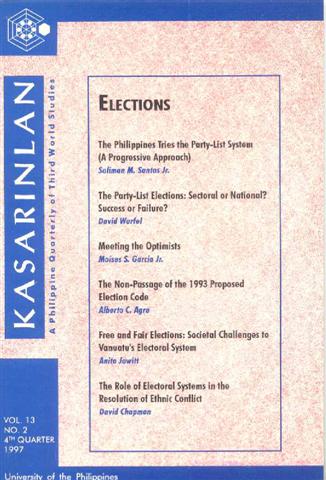Free and Fair Elections: Societal Challenges to Vanuatu's Electoral System
Abstract
To exercise his right to vote a citizen must also be given every opportunity to make an informed choice. Information regarding candidates, parties and issues must be made available to him. In Vanuatu the right to suffrage is universal. The law allows any citizen who is at least 18 years of age and who is not in prison or confined in a mental institution to participate in regularly held elections. However, the lack of general education or a specific political awareness program negates the essence of this right. A substantial portion of its citizenry is illiterate. Limiting the citizens' access to political information is a limited media. Vanuatu's newspapers and news broadcasts, often subject to government censorship, reach only a fraction of the population. Equally limiting is the role of women in the male-dominated community in which the source of information and debate is a monopoly of one gender. Also, the system of kin obligation deeply imbeded in Vanuatuan culture reduces voting to an act of obedience. As a result, majority of Vanuatu's voters base their decisions on a very limited understanding of the electoral process, its participants, particularly the candidates and political parties, and issues relevant to the governance of the islands. The democratic ideal results only in disillusioned citizens and meaningless elections.
Published
2007-10-10
How to Cite
JOWITT, Anita.
Free and Fair Elections: Societal Challenges to Vanuatu's Electoral System.
Kasarinlan: Philippine Journal of Third World Studies, [S.l.], v. 13, n. 2, p. 79-90, oct. 2007.
ISSN 2012-080X.
Available at: <https://journals.upd.edu.ph/index.php/kasarinlan/article/view/324>. Date accessed: 27 aug. 2025.
Section
Features
Keywords
suffrage; election; women; kin; obligation
By submitting a manuscript, the authors agree that the exclusive rights to reproduce and distribute the article have been given to the Third World Studies Center.



